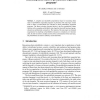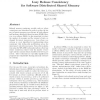150 search results - page 11 / 30 » A Calculus for Relaxed Memory |
193
click to vote
POPL
2009
ACM
16 years 1 months ago
2009
ACM
Multiprocessors are now dominant, but real multiprocessors do not provide the sequentially consistent memory that is assumed by most work on semantics and verification. Instead, t...
119
click to vote
CSL
2006
Springer
15 years 4 months ago
2006
Springer
A complete and decidable propositional logic for reasoning about states of probabilistic sequential programs is presented. The state logic is then used to obtain a sound Hoare-styl...
IAT
2008
IEEE
15 years 6 months ago
2008
IEEE
Quantum service selection facilitates matchmaking of Web services and greatly benefits from quantum memory exponential in the number of its qubits as well as from computational s...
136
click to vote
PLDI
2011
ACM
14 years 3 months ago
2011
ACM
Program analysis and verification tools crucially depend on the ability to symbolically describe and reason about sets of program behaviors. Separation logic provides a promising...
116
click to vote
ISCA
1992
IEEE
15 years 4 months ago
1992
IEEE
Relaxed memory consistency models, such as release consistency, were introduced in order to reduce the impact of remote memory access latency in both software and hardware distrib...


